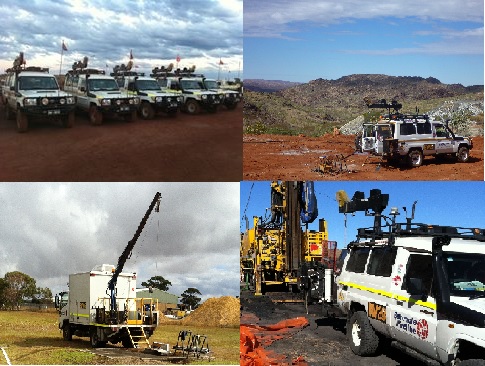<h4>Why use the services of a logging contractor?</h4>
Geophysical borehole logging is a standard service in the mining, geotechnical, hydrogeological and environmental fields producing in situ physical rock properties rapidly and cost effectively. The geophysical logger is commonly part of a team – drilling, geologist, and field assistant – not the most expensive part of the team but which can cause significant additional costs if the service is provided poorly or inadequate data quality is attained.
<h4>Logging Contractor v Rental Equipment</h4>
The alternative to the logging contractor are twofold:
- The “company/consultant” can purchase the equipment themselves and provide the service themselves.
- A “company/consultant” can rent logging equipment for a job and provide the service themselves.
Let’s have a look at some of the pros and cons:
<h4>Equipment purchase</h4>
+ In the whole scheme of exploration, mining or large civil projects, the capital costs of geophysical logging equipment are reasonably small, so the equipment purchase can seem attractive.
+ The ability to use in house personnel to provide the service, possibly multi-tasking over a range of duties (say field assistant) could seem attractive in terms of employee costs.
– Too often, once the capital purchase has been made, little if any thought (or money) is put into staff training or more importantly ongoing service and maintenance (yes – equipment, just like your motor car requires ongoing servicing). Commonly a small value “widget” for the logging system is overlooked. No spare is on hand and there is commonly a long lead time for the replacement, all of which leads to the equipment being unavailable leading to drilling delays or a lack of data coverage when drilling proceeds without logging.
– Even though the logging is identified as “critical” there rarely seems to be anyone soley responsible for a successful outcome. The logging equipment’s storage and transport would seem to be an afterthought.
<h4>Equipment rental</h4>
Rental of logging equipment is commonly considered by consultants for ongoing projects where they have people already on site for the project.
+ Paying for the time the equipment is used seems attractive.
– Equipment rental tends not to have the same equipment range available
– What is the history of the equipment? Verification and on-going performance of the electronic equipment is a fundamental part of the data quality process.
– Too often the liability for equipment is not in the hands of the renter rather than end client. Can the end client be assured of good operations?
Too often a consultant may feel they can add value or get more of the “pie” by offering these services but where is the due diligence for their work.
<h4>Benefits of using a logging contractor</h4>
Logging contractors know their job. They have designed their units for maximum efficiency and kit out their units with a range of spares and accessory equipment.
They have systems in place for training of their personnel, maintenance and servicing of their equipment, equipment history and most importantly spare equipment on hand and relationships with essential spare component suppliers.
When considering whether to employ a logging contractor or buy your own logging equipment and operate yourself or rent equipment and operate yourself, ask yourself the following questions:
- What is the cost of holding up the drilling rig?
The geophysical logger is part of a team, not the most expensive part, but failed equipment/data collection can cause additional expense by holding up the drilling. Time is money.
- What is the cost of a bad log?
- What will be the effect upon “data precision”?
<h4>Some real world examples</h4>
A consultant uses their in house logging equipment for some density logging (Cs137 radioactive source attached), we (Borehole Wireline) get a call, client introduces himself from a previous job, then asks “Who do I ring when we have a radioactive source stuck in a hole?” an interesting conversation follows! Roughly a month later we receive a letter addressed to all companies that wireline log reminding us that it is important to re terminate our cablehead regularly…..join the dots! This is logging 101 stuff that just doesn’t seem to happen.
Consultant B wants more of the “pie” on a geotechnical programme and persuades the client to hire some logging equipment. There was no training of the operator and no accessory equipment. The probe becomes lodged in the borehole and as no fishing equipment or expertise was on hand, the options were limited for the probe retrieval. Later the poor client was hit with an $80K bill for the probe loss. It is always “tricky” trying to engage the logging contractor you have cut out of work for help with probe recovery!
A Checklist for success
- Make sure your logging contractor has a track record of success.
- They have the equipment and manpower to achieve your goals
- A robust set of policies and procedures and a culture that follows these
- Understand who is taking what risk, probe loss, radioactive source loss, down days (wet days, Driller and logger breakdowns).
- Spend some time engaging your contractor, met with them, visit their office see what they are all about, this is a very small investment in the success of your project.

